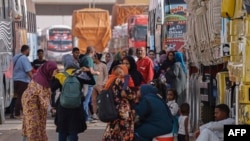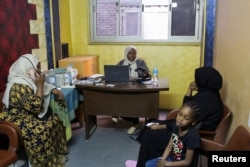Egypt has been struggling to cope with a new wave of refugees from Africa after the latest round of conflicts erupted in Sudan and Ethiopia. The UNHCR appears to be having difficulties dealing with the large numbers of refugees and Egyptian authorities slapped a visa requirement on Sudanese refugees trying to enter the country several days ago.
Scores of recently arrived Sudanese refugees gather outside the UNHCR building in Cairo's normally quiet suburb of Zamalek. A refugee charity organization is handing out food and blankets to refugee families who appear tired and distraught from their recent ordeal fleeing the ongoing fighting in the Sudanese capital, Khartoum.
Agothe, a 30-year-old Sudanese mother of five, lost track of her husband in the rush to flee Khartoum and several of her children became ill during the disorganized trek to the Egyptian border and days of sleeping in unsanitary conditions. While she has found food and medical care for her children in Cairo, her husband is still missing, and she only has temporary shelter to live in.
At the same time, dozens of Syrian refugees, most of whom fled to Egypt several years ago, gather outside a side-door to the U.N. facility that is trying to help them. Most of them have jobs and a place to stay, but their situation remains precarious. Several told VOA that they were worried about being sent back to Syria now that the Arab League has normalized ties with Damascus.
Miriam, a middle-aged woman from Damascus, told VOA that she would be happy to return to Syria, but that she is worried that her 18-year-old nephew, who lives with her, will be drafted into the Syrian Army if he returns with her.
She said that she doesn't want to see her nephew Maher die in a new war in Syria. We've already lost half our family in the last war, she said, and I don't want to see any more of them die.
Cairo is also awash with refugees from African countries that have witnessed conflicts in recent months or years. Andre, who comes from the Democratic Republic of Congo, told VOA that militia fighters took him from his family and killed his father, who tried to stop them. He recounts being tortured and treated like a slave before he was finally able to flee to Uganda, then Sudan, and finally on to Egypt.
Andre said that he has been struggling to get his situation sorted out with the U.N. refugee agency, but that no one wants to listen to him since he speaks French and not English or Arabic. He recounts sleeping outside buildings on many nights and worries that he could get deported back to Congo.
Mohammed, a 50-year-old refugee from Tigray, in Ethiopia, said that he has been fleeing from place to place since he was a young man. He had a successful business in Sudan, before militia fighters stole his property and forced him to flee, along with part of his family.
He said that he can't go back because his business was confiscated and the militiamen who took it could decide to kill him to hide what they've done. Mohammed said that he still hasn't found a job in Egypt, but that his wife is helping to make ends meet by doing odd jobs and cooking for Egyptian families.
Ahmed, a young man from Somalia, told VOA that other Somalis have been harassing him because they don't like him and because they see him hanging around churches.
He said that he's had to change his place of residence and change his phone number because other Somalis were trying to harm him. “They don't like the fact that I am Christian,” he said, “and they want to make an example of me to other Somalis.”
Sardo, a lanky young man from South Sudan told VOA that he was forced to flee Khartoum for Juba when the two countries split in 2010. He said that he didn't want to leave but had no choice. After several months in Juba, however, Sardo found himself in a South Sudanese jail. He describes his arrest, which happened while he was working at a store.
“They came with eight commandos and then they came down, they (entered) the gallery and say 'this is the one.' They hold my leg and they drop me into the car and he put his leg on my neck to break my neck. Then I say ‘Jesus.’ Then I stay there more than three months. Suddenly they released me at night. When we reached the place where it's a jungle, they opened the door, they called my name and they take me by my neck and drop me down. When I woke up, the dogs were running to me to bite me,” he said.
Sardo told VOA that some of the same South Sudanese militiamen tracked him down to his home in Cairo, as well, where they threatened to kill him, again. Sardo fled to a new location and is still afraid to be seen during the day in his old neighborhood.
Walid, a twenty-something Sudanese man from Nuba Mountain, told VOA that many young Sudanese refugees have turned to violence and roam around with gangs because they have no jobs, can't go to school and their parents have lost control over them.
A gang of young Sudanese men run around with knives in the street around a residential building in an outer Cairo suburb. The gang threatens passers-by and robs a number of people before running off.
"Being a refugee is not easy,” said Walid. Many young people can't cope with it and end up in jail.
Some even take their own lives.
A young Sudanese man jumped off a bridge, earlier this year, after he became depressed.





